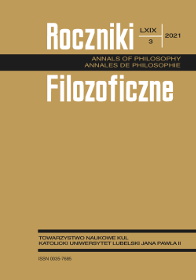From Satan’s Wager to Eve’s Gambit to Our Leap: An Anselmian Reply to the Problem of Divine Hiddenness
Abstrakt
Od zakładu szatana, przez podstęp Ewy, do naszego skoku: anzelmiańska odpowiedź na problem Bożego ukrycia
Chociaż u św. Anzelma nie znajdziemy wyraźnej dyskusji na temat problemu Bożego ukrycia (PBU), tak jak jest on dziś powszechnie rozumiany – mianowicie jako argument za ateizmem – to jest on doskonale świadomy trudności egzystencjalnych, jakie stwarza nasz pozorny brak dostępu do Boga. Co więcej, dostarcza on składników dla interesującego i dotychczas zaniedbanego podejścia do PBU, zakorzenionego w wielu chrześcijańskich narracjach o odstępstwach od stanu łaski, zarówno anielskich, jak i ludzkich. Celem tego artykułu jest wyraźne nakreślenie podejścia Anzelma i dostarczenie przynajmniej szczątkowego jego rozwiązania PBU.
Bibliografia
Athanasius. On the Incarnation of the Word. Translated by Archibald Robertson. Buffalo, NY: Christian Literature Publishing, 1892.
Augustine. On Free Choice of the Will. Translated by Thomas Williams. Indianapolis: Hackett, 1993.
Azadegan, Ebrahim. “Divine Love and the Argument from Divine Hiddenness.” European Journal for Philosophy of Religion 6, no. 2 (2014): 101–16.
Chrysostom, John. Homilies on First Corinthians. Translated by Talbot W. Chambers. Buffalo, NY: Christian Literature Publishing, 1889.
Coakley, Sarah. “Divine Hiddenness or Dark Intimacy? How John of the Cross Dissolves a Contemporary Philosophical Dilemma.” In Hidden Divinity and Religious Belief: New Perspectives, edited by Adam Green and Eleonore Stump, 229–45. Cambridge: Cambridge University Press, 2015.
Confessor, Maximus. On Difficulties in Sacred Scripture: The Responses to Thalassios. Translated by Maximos Constas. Washington, DC: Catholic University of America Press, 2018.
Damascene, John. On the Orthodox Faith. In Writings. Translated by Frederic Chase. Washington, DC: Catholic University of America Press, 1958.
Di Ceglie, Roberto. “Christian Belief, Love for God, and Divine Hiddenness.” Philosophia Christi 18, no. 1 (2016): 179–93.
Drange, Theodore. “The Argument from Non-Belief.” Religious Studies 29, no. 4 (1993): 417–32.
Drange, Theodore. Nonbelief and Evil: An Argument for the Nonexistence of God. Amherst, NY: Prometheus, 1998.
Dumsday, Travis. “A Thomistic Response to the Problem of Divine Hiddenness.” American Catholic Philosophical Quarterly 87, no. 3 (2013): 365–77.
Garcia, Laura. “St. John of the Cross and the Necessity of Divine Hiddenness.” In Divine Hiddenness: New Essays, edited by Daniel Howard-Snyder and Paul Moser, 83–97. Cambridge: Cambridge University Press, 2002.
Henry, Douglas. “Does Reasonable Nonbelief Exist?” Faith and Philosophy 18, no. 1 (2001): 75–92.
Henry, Douglas. “Reasonable Doubts about Reasonable Nonbelief.” Faith and Philosophy 25, no. 3 (2008): 276–89.
Jackson, Elisabeth. “Wagering against Divine Hiddenness.” European Journal for Philosophy of Religion 8, no. 4 (2016): 85–108.
Keller, James. “The Hiddenness of God and the Problem of Evil.” International Journal for Philosophy of Religion 37, no. 1 (1995): 13–24.
King, Rolfe. Obstacles to Divine Revelation: God and the Reorientation of Human Reason. London: Continuum, 2008.
Lossky, Vladimir. The Mystical Theology of the Eastern Church. Crestwood, New York: St. Vladimir’s Seminary Press, 1957.
Maitzen, Stephen. “Divine Hiddenness and the Demographics of Theism.” Religious Studies 42, no. 2 (2006): 177–91.
Marcar, G. P. “Aquinas’ Quinque Viae: Fools, Evil, and the Hiddenness of God.” Heythrop Journal 56, no. 1 (2015): 67–75.
Morris, Thomas V. Making Sense of It All: Pascal and the Meaning of Life. Grand Rapids, MI: Eerdmans, 1992.
Murray, Michael. “Deus Absconditus.” In Divine Hiddenness: New Essays, ed. Daniel Howard-Snyder and Paul Moser, 62–82. Cambridge: Cambridge University Press, 2002.
Nazianzus, Gregory. Orations. Translated by Charles G. Browne and James E. Swallow. Buffalo, NY: Christian Literature Publishing, 1894.
Nemoianu, V. Martin. “Pascal on Divine Hiddenness.” International Philosophical Quarterly 55, no. 3 (2015): 325–43.
Origen, On First Principles. Translated by Frederick Crombie. Buffalo, NY: Christian Literature Publishing, 1885.
Paytas, Tyler. “Of Providence and Puppet Shows: Divine Hiddenness as Kantian Theodicy.” Faith and Philosophy 36, no. 1 (2019): 56–80.
Pseudo-Dionysius. The Celestial Hierarchy. In Pseudo-Dionysius: The Complete Works, translated by Colm Luibheid, 260C–261D. Mahwah, NJ: Paulist Press, 1987.
Rogers, Katherin. Anselm on Freedom. Oxford: Oxford University Press, 2008.
Rogers, Katherin. Freedom and Self-Creation: Anselmian Libertarianism. Oxford: Oxford University Press, 2015.
Rogers, Katherin. Perfect Being Theology. Edinburgh: Edinburgh University Press, 2000.
Rogers, Katherin. The Neoplatonic Metaphysics and Epistemology of Anselm of Canterbury. Lewiston, NY: Edwin Mellen Press, 1997.
Schellenberg, J. L. Divine Hiddenness and Human Reason. Ithaca, NY: Cornell University Press, 1993.
Schellenberg, J. L. The Hiddenness Argument: Philosophy’s New Challenge to Belief in God. Oxford: Oxford University Press, 2015.
Schellenberg, J. L. The Wisdom to Doubt: A Justification of Religious Skepticism. Ithaca, NY: Cornell University Press, 2007.
Swinburne, Richard. Providence and the Problem of Evil. Oxford: Oxford University Press, 1998.
Swinburne, Richard. The Existence of God, 2nd ed. Oxford: Oxford University Press, 2004.
Williams, Thomas, trans. Anselm: Basic Writings. Indianapolis, IN: Hackett, 2007.
Copyright (c) 2021 Roczniki Filozoficzne

Utwór dostępny jest na licencji Creative Commons Uznanie autorstwa – Użycie niekomercyjne – Bez utworów zależnych 4.0 Międzynarodowe.





